Legalizing Commercial Surrogacy: A Comprehensive Analysis
VerifiedAdded on 2023/03/31
|7
|1701
|365
Essay
AI Summary
This essay delves into the contentious issue of commercial surrogacy, examining the arguments both for and against its legalization. It highlights the opportunities surrogacy offers to individuals and couples facing infertility, while also acknowledging potential ethical concerns related to the well-being of surrogate mothers and the rights of the child. The essay explores the legal and social implications, including the complexities of defining parental rights, the impact on women's employment, and the potential for exploitation. It references various academic sources to provide a balanced perspective on the subject, ultimately aiming to contribute to a nuanced understanding of the ongoing debate surrounding commercial surrogacy and its role in modern reproductive practices. The paper discusses the views of various researchers on the subject.
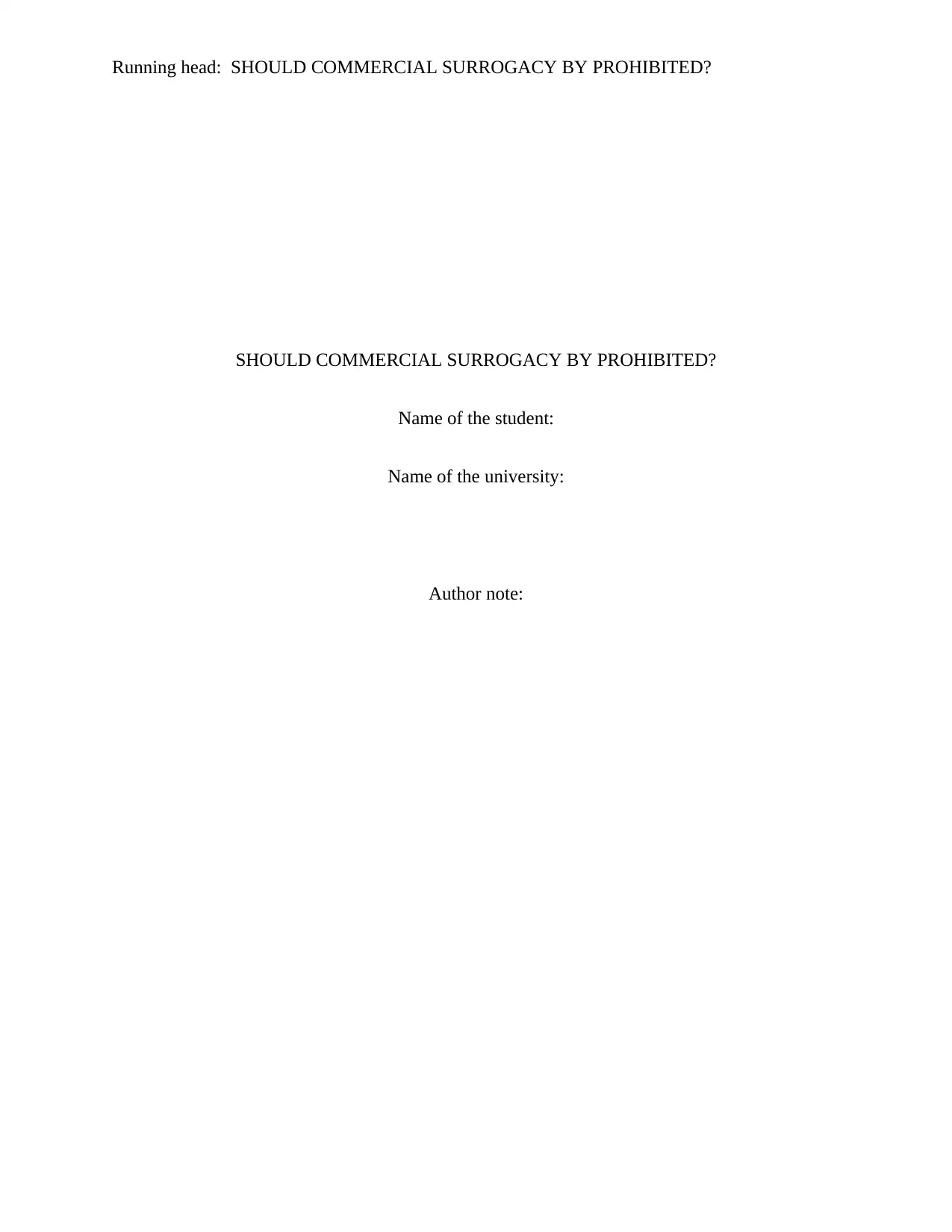
Running head: SHOULD COMMERCIAL SURROGACY BY PROHIBITED?
SHOULD COMMERCIAL SURROGACY BY PROHIBITED?
Name of the student:
Name of the university:
Author note:
SHOULD COMMERCIAL SURROGACY BY PROHIBITED?
Name of the student:
Name of the university:
Author note:
Paraphrase This Document
Need a fresh take? Get an instant paraphrase of this document with our AI Paraphraser
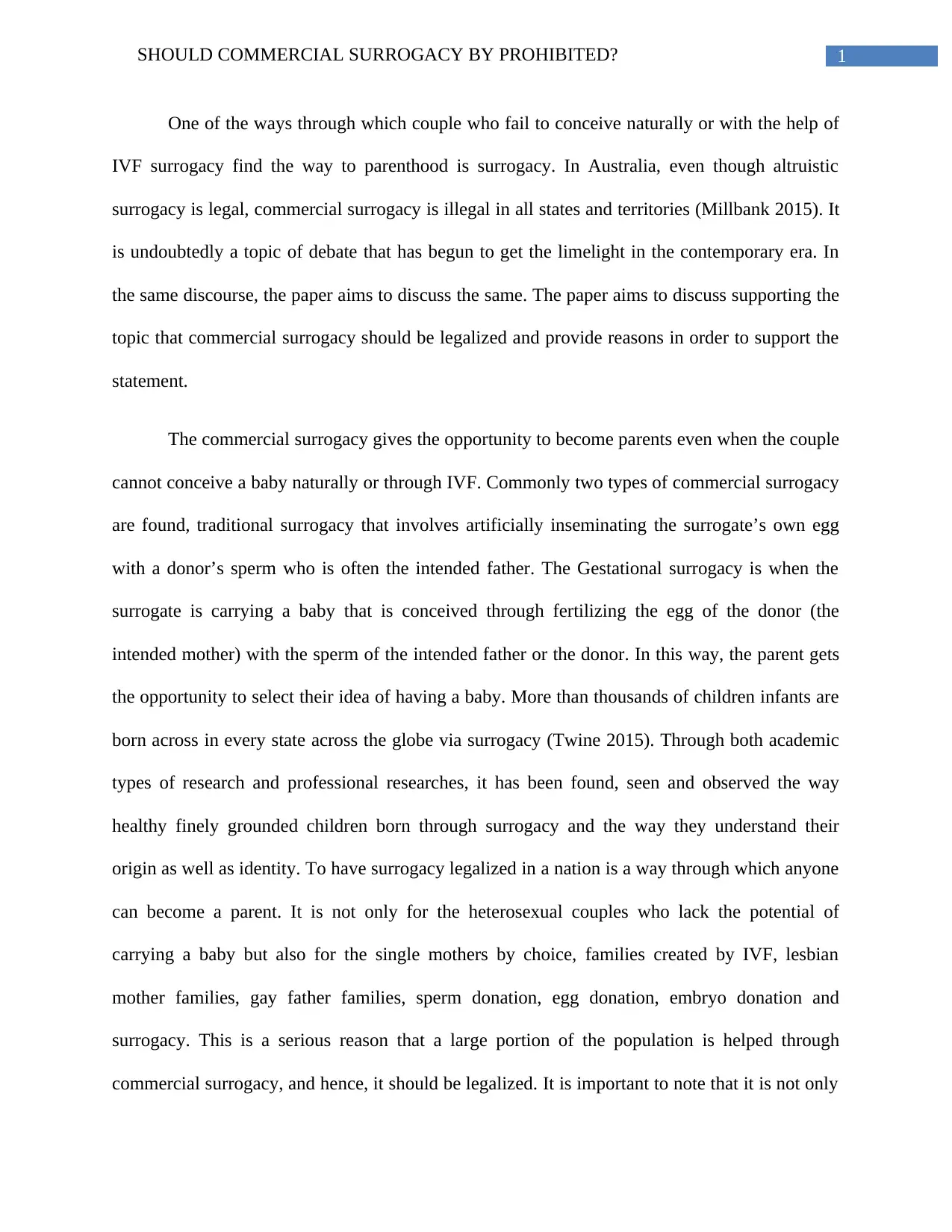
1SHOULD COMMERCIAL SURROGACY BY PROHIBITED?
One of the ways through which couple who fail to conceive naturally or with the help of
IVF surrogacy find the way to parenthood is surrogacy. In Australia, even though altruistic
surrogacy is legal, commercial surrogacy is illegal in all states and territories (Millbank 2015). It
is undoubtedly a topic of debate that has begun to get the limelight in the contemporary era. In
the same discourse, the paper aims to discuss the same. The paper aims to discuss supporting the
topic that commercial surrogacy should be legalized and provide reasons in order to support the
statement.
The commercial surrogacy gives the opportunity to become parents even when the couple
cannot conceive a baby naturally or through IVF. Commonly two types of commercial surrogacy
are found, traditional surrogacy that involves artificially inseminating the surrogate’s own egg
with a donor’s sperm who is often the intended father. The Gestational surrogacy is when the
surrogate is carrying a baby that is conceived through fertilizing the egg of the donor (the
intended mother) with the sperm of the intended father or the donor. In this way, the parent gets
the opportunity to select their idea of having a baby. More than thousands of children infants are
born across in every state across the globe via surrogacy (Twine 2015). Through both academic
types of research and professional researches, it has been found, seen and observed the way
healthy finely grounded children born through surrogacy and the way they understand their
origin as well as identity. To have surrogacy legalized in a nation is a way through which anyone
can become a parent. It is not only for the heterosexual couples who lack the potential of
carrying a baby but also for the single mothers by choice, families created by IVF, lesbian
mother families, gay father families, sperm donation, egg donation, embryo donation and
surrogacy. This is a serious reason that a large portion of the population is helped through
commercial surrogacy, and hence, it should be legalized. It is important to note that it is not only
One of the ways through which couple who fail to conceive naturally or with the help of
IVF surrogacy find the way to parenthood is surrogacy. In Australia, even though altruistic
surrogacy is legal, commercial surrogacy is illegal in all states and territories (Millbank 2015). It
is undoubtedly a topic of debate that has begun to get the limelight in the contemporary era. In
the same discourse, the paper aims to discuss the same. The paper aims to discuss supporting the
topic that commercial surrogacy should be legalized and provide reasons in order to support the
statement.
The commercial surrogacy gives the opportunity to become parents even when the couple
cannot conceive a baby naturally or through IVF. Commonly two types of commercial surrogacy
are found, traditional surrogacy that involves artificially inseminating the surrogate’s own egg
with a donor’s sperm who is often the intended father. The Gestational surrogacy is when the
surrogate is carrying a baby that is conceived through fertilizing the egg of the donor (the
intended mother) with the sperm of the intended father or the donor. In this way, the parent gets
the opportunity to select their idea of having a baby. More than thousands of children infants are
born across in every state across the globe via surrogacy (Twine 2015). Through both academic
types of research and professional researches, it has been found, seen and observed the way
healthy finely grounded children born through surrogacy and the way they understand their
origin as well as identity. To have surrogacy legalized in a nation is a way through which anyone
can become a parent. It is not only for the heterosexual couples who lack the potential of
carrying a baby but also for the single mothers by choice, families created by IVF, lesbian
mother families, gay father families, sperm donation, egg donation, embryo donation and
surrogacy. This is a serious reason that a large portion of the population is helped through
commercial surrogacy, and hence, it should be legalized. It is important to note that it is not only
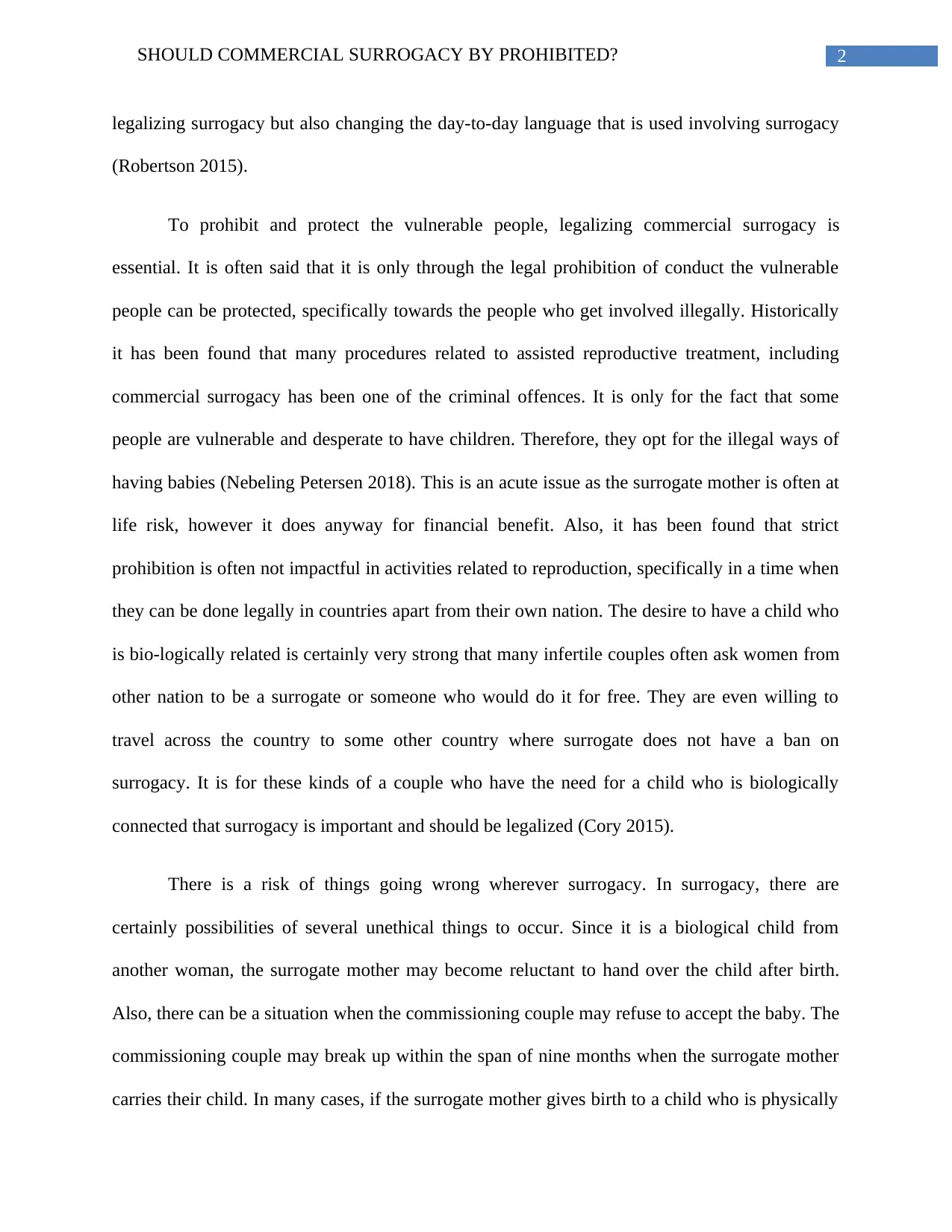
2SHOULD COMMERCIAL SURROGACY BY PROHIBITED?
legalizing surrogacy but also changing the day-to-day language that is used involving surrogacy
(Robertson 2015).
To prohibit and protect the vulnerable people, legalizing commercial surrogacy is
essential. It is often said that it is only through the legal prohibition of conduct the vulnerable
people can be protected, specifically towards the people who get involved illegally. Historically
it has been found that many procedures related to assisted reproductive treatment, including
commercial surrogacy has been one of the criminal offences. It is only for the fact that some
people are vulnerable and desperate to have children. Therefore, they opt for the illegal ways of
having babies (Nebeling Petersen 2018). This is an acute issue as the surrogate mother is often at
life risk, however it does anyway for financial benefit. Also, it has been found that strict
prohibition is often not impactful in activities related to reproduction, specifically in a time when
they can be done legally in countries apart from their own nation. The desire to have a child who
is bio-logically related is certainly very strong that many infertile couples often ask women from
other nation to be a surrogate or someone who would do it for free. They are even willing to
travel across the country to some other country where surrogate does not have a ban on
surrogacy. It is for these kinds of a couple who have the need for a child who is biologically
connected that surrogacy is important and should be legalized (Cory 2015).
There is a risk of things going wrong wherever surrogacy. In surrogacy, there are
certainly possibilities of several unethical things to occur. Since it is a biological child from
another woman, the surrogate mother may become reluctant to hand over the child after birth.
Also, there can be a situation when the commissioning couple may refuse to accept the baby. The
commissioning couple may break up within the span of nine months when the surrogate mother
carries their child. In many cases, if the surrogate mother gives birth to a child who is physically
legalizing surrogacy but also changing the day-to-day language that is used involving surrogacy
(Robertson 2015).
To prohibit and protect the vulnerable people, legalizing commercial surrogacy is
essential. It is often said that it is only through the legal prohibition of conduct the vulnerable
people can be protected, specifically towards the people who get involved illegally. Historically
it has been found that many procedures related to assisted reproductive treatment, including
commercial surrogacy has been one of the criminal offences. It is only for the fact that some
people are vulnerable and desperate to have children. Therefore, they opt for the illegal ways of
having babies (Nebeling Petersen 2018). This is an acute issue as the surrogate mother is often at
life risk, however it does anyway for financial benefit. Also, it has been found that strict
prohibition is often not impactful in activities related to reproduction, specifically in a time when
they can be done legally in countries apart from their own nation. The desire to have a child who
is bio-logically related is certainly very strong that many infertile couples often ask women from
other nation to be a surrogate or someone who would do it for free. They are even willing to
travel across the country to some other country where surrogate does not have a ban on
surrogacy. It is for these kinds of a couple who have the need for a child who is biologically
connected that surrogacy is important and should be legalized (Cory 2015).
There is a risk of things going wrong wherever surrogacy. In surrogacy, there are
certainly possibilities of several unethical things to occur. Since it is a biological child from
another woman, the surrogate mother may become reluctant to hand over the child after birth.
Also, there can be a situation when the commissioning couple may refuse to accept the baby. The
commissioning couple may break up within the span of nine months when the surrogate mother
carries their child. In many cases, if the surrogate mother gives birth to a child who is physically
⊘ This is a preview!⊘
Do you want full access?
Subscribe today to unlock all pages.

Trusted by 1+ million students worldwide
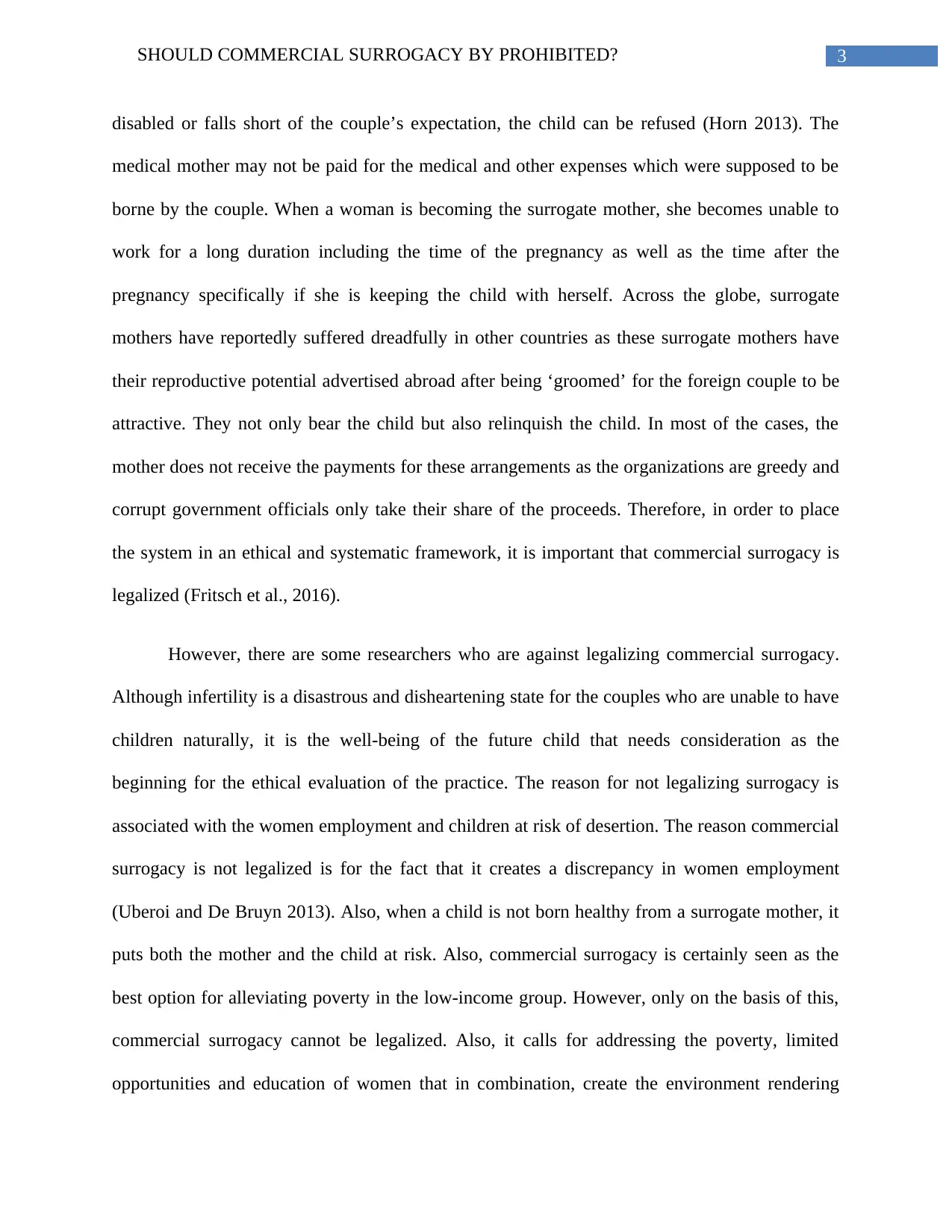
3SHOULD COMMERCIAL SURROGACY BY PROHIBITED?
disabled or falls short of the couple’s expectation, the child can be refused (Horn 2013). The
medical mother may not be paid for the medical and other expenses which were supposed to be
borne by the couple. When a woman is becoming the surrogate mother, she becomes unable to
work for a long duration including the time of the pregnancy as well as the time after the
pregnancy specifically if she is keeping the child with herself. Across the globe, surrogate
mothers have reportedly suffered dreadfully in other countries as these surrogate mothers have
their reproductive potential advertised abroad after being ‘groomed’ for the foreign couple to be
attractive. They not only bear the child but also relinquish the child. In most of the cases, the
mother does not receive the payments for these arrangements as the organizations are greedy and
corrupt government officials only take their share of the proceeds. Therefore, in order to place
the system in an ethical and systematic framework, it is important that commercial surrogacy is
legalized (Fritsch et al., 2016).
However, there are some researchers who are against legalizing commercial surrogacy.
Although infertility is a disastrous and disheartening state for the couples who are unable to have
children naturally, it is the well-being of the future child that needs consideration as the
beginning for the ethical evaluation of the practice. The reason for not legalizing surrogacy is
associated with the women employment and children at risk of desertion. The reason commercial
surrogacy is not legalized is for the fact that it creates a discrepancy in women employment
(Uberoi and De Bruyn 2013). Also, when a child is not born healthy from a surrogate mother, it
puts both the mother and the child at risk. Also, commercial surrogacy is certainly seen as the
best option for alleviating poverty in the low-income group. However, only on the basis of this,
commercial surrogacy cannot be legalized. Also, it calls for addressing the poverty, limited
opportunities and education of women that in combination, create the environment rendering
disabled or falls short of the couple’s expectation, the child can be refused (Horn 2013). The
medical mother may not be paid for the medical and other expenses which were supposed to be
borne by the couple. When a woman is becoming the surrogate mother, she becomes unable to
work for a long duration including the time of the pregnancy as well as the time after the
pregnancy specifically if she is keeping the child with herself. Across the globe, surrogate
mothers have reportedly suffered dreadfully in other countries as these surrogate mothers have
their reproductive potential advertised abroad after being ‘groomed’ for the foreign couple to be
attractive. They not only bear the child but also relinquish the child. In most of the cases, the
mother does not receive the payments for these arrangements as the organizations are greedy and
corrupt government officials only take their share of the proceeds. Therefore, in order to place
the system in an ethical and systematic framework, it is important that commercial surrogacy is
legalized (Fritsch et al., 2016).
However, there are some researchers who are against legalizing commercial surrogacy.
Although infertility is a disastrous and disheartening state for the couples who are unable to have
children naturally, it is the well-being of the future child that needs consideration as the
beginning for the ethical evaluation of the practice. The reason for not legalizing surrogacy is
associated with the women employment and children at risk of desertion. The reason commercial
surrogacy is not legalized is for the fact that it creates a discrepancy in women employment
(Uberoi and De Bruyn 2013). Also, when a child is not born healthy from a surrogate mother, it
puts both the mother and the child at risk. Also, commercial surrogacy is certainly seen as the
best option for alleviating poverty in the low-income group. However, only on the basis of this,
commercial surrogacy cannot be legalized. Also, it calls for addressing the poverty, limited
opportunities and education of women that in combination, create the environment rendering
Paraphrase This Document
Need a fresh take? Get an instant paraphrase of this document with our AI Paraphraser
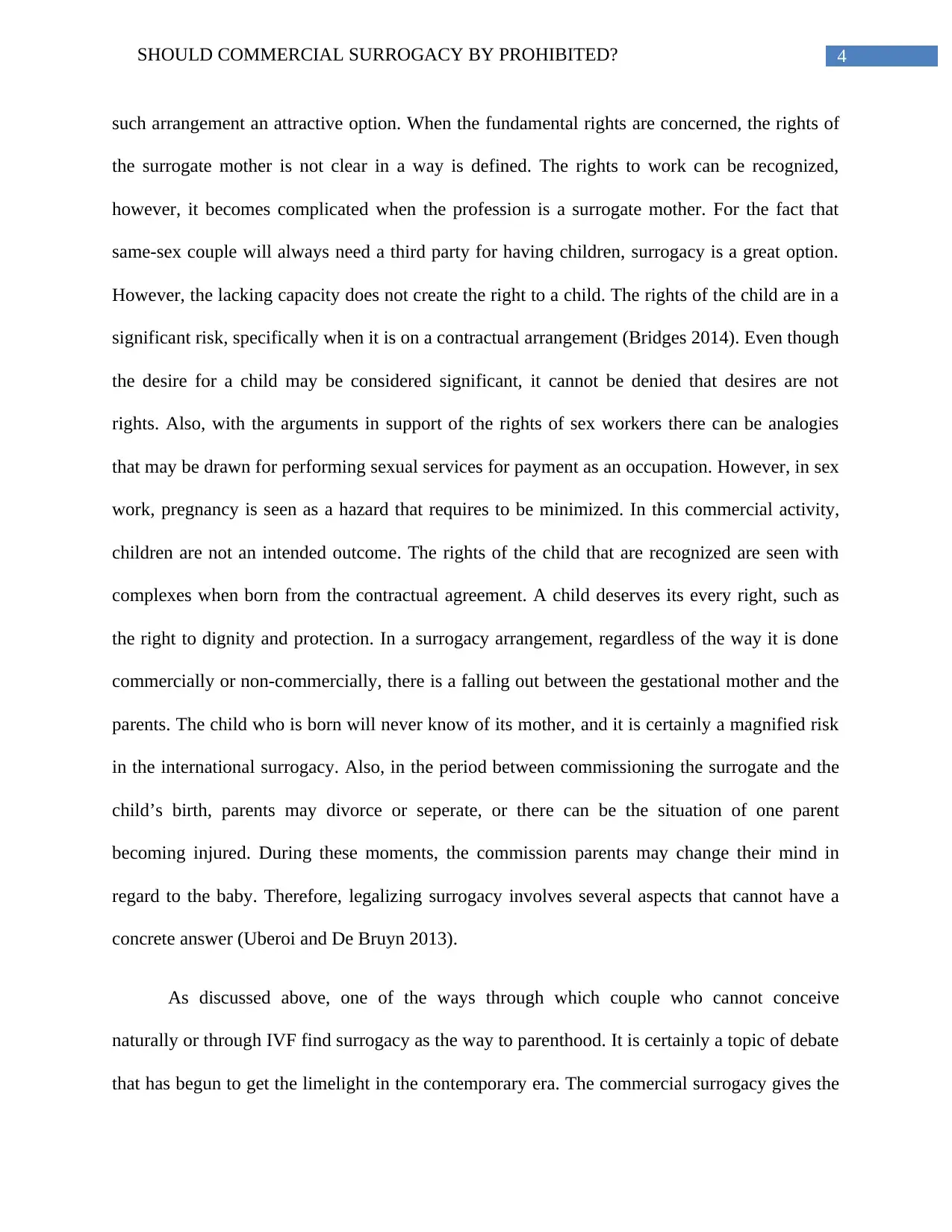
4SHOULD COMMERCIAL SURROGACY BY PROHIBITED?
such arrangement an attractive option. When the fundamental rights are concerned, the rights of
the surrogate mother is not clear in a way is defined. The rights to work can be recognized,
however, it becomes complicated when the profession is a surrogate mother. For the fact that
same-sex couple will always need a third party for having children, surrogacy is a great option.
However, the lacking capacity does not create the right to a child. The rights of the child are in a
significant risk, specifically when it is on a contractual arrangement (Bridges 2014). Even though
the desire for a child may be considered significant, it cannot be denied that desires are not
rights. Also, with the arguments in support of the rights of sex workers there can be analogies
that may be drawn for performing sexual services for payment as an occupation. However, in sex
work, pregnancy is seen as a hazard that requires to be minimized. In this commercial activity,
children are not an intended outcome. The rights of the child that are recognized are seen with
complexes when born from the contractual agreement. A child deserves its every right, such as
the right to dignity and protection. In a surrogacy arrangement, regardless of the way it is done
commercially or non-commercially, there is a falling out between the gestational mother and the
parents. The child who is born will never know of its mother, and it is certainly a magnified risk
in the international surrogacy. Also, in the period between commissioning the surrogate and the
child’s birth, parents may divorce or seperate, or there can be the situation of one parent
becoming injured. During these moments, the commission parents may change their mind in
regard to the baby. Therefore, legalizing surrogacy involves several aspects that cannot have a
concrete answer (Uberoi and De Bruyn 2013).
As discussed above, one of the ways through which couple who cannot conceive
naturally or through IVF find surrogacy as the way to parenthood. It is certainly a topic of debate
that has begun to get the limelight in the contemporary era. The commercial surrogacy gives the
such arrangement an attractive option. When the fundamental rights are concerned, the rights of
the surrogate mother is not clear in a way is defined. The rights to work can be recognized,
however, it becomes complicated when the profession is a surrogate mother. For the fact that
same-sex couple will always need a third party for having children, surrogacy is a great option.
However, the lacking capacity does not create the right to a child. The rights of the child are in a
significant risk, specifically when it is on a contractual arrangement (Bridges 2014). Even though
the desire for a child may be considered significant, it cannot be denied that desires are not
rights. Also, with the arguments in support of the rights of sex workers there can be analogies
that may be drawn for performing sexual services for payment as an occupation. However, in sex
work, pregnancy is seen as a hazard that requires to be minimized. In this commercial activity,
children are not an intended outcome. The rights of the child that are recognized are seen with
complexes when born from the contractual agreement. A child deserves its every right, such as
the right to dignity and protection. In a surrogacy arrangement, regardless of the way it is done
commercially or non-commercially, there is a falling out between the gestational mother and the
parents. The child who is born will never know of its mother, and it is certainly a magnified risk
in the international surrogacy. Also, in the period between commissioning the surrogate and the
child’s birth, parents may divorce or seperate, or there can be the situation of one parent
becoming injured. During these moments, the commission parents may change their mind in
regard to the baby. Therefore, legalizing surrogacy involves several aspects that cannot have a
concrete answer (Uberoi and De Bruyn 2013).
As discussed above, one of the ways through which couple who cannot conceive
naturally or through IVF find surrogacy as the way to parenthood. It is certainly a topic of debate
that has begun to get the limelight in the contemporary era. The commercial surrogacy gives the
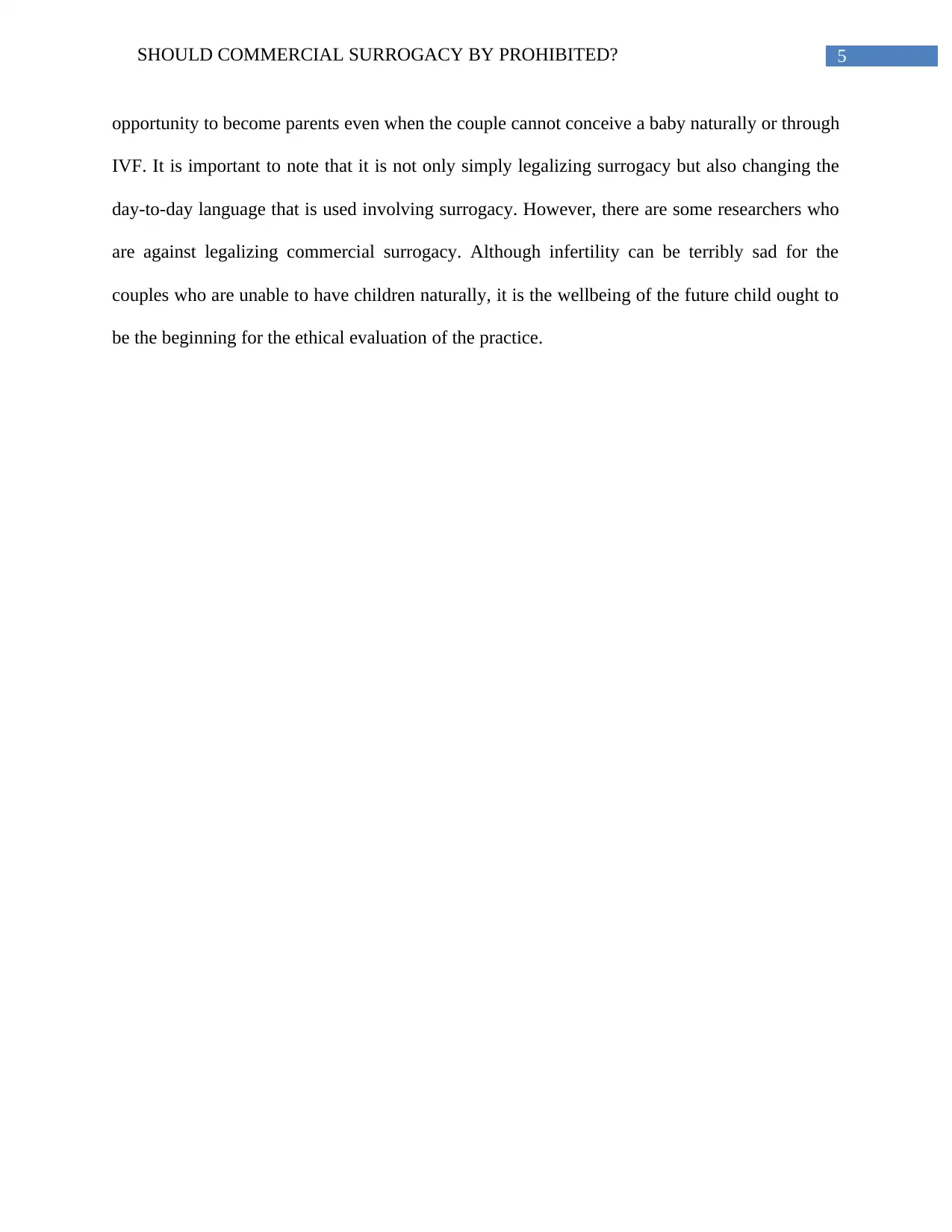
5SHOULD COMMERCIAL SURROGACY BY PROHIBITED?
opportunity to become parents even when the couple cannot conceive a baby naturally or through
IVF. It is important to note that it is not only simply legalizing surrogacy but also changing the
day-to-day language that is used involving surrogacy. However, there are some researchers who
are against legalizing commercial surrogacy. Although infertility can be terribly sad for the
couples who are unable to have children naturally, it is the wellbeing of the future child ought to
be the beginning for the ethical evaluation of the practice.
opportunity to become parents even when the couple cannot conceive a baby naturally or through
IVF. It is important to note that it is not only simply legalizing surrogacy but also changing the
day-to-day language that is used involving surrogacy. However, there are some researchers who
are against legalizing commercial surrogacy. Although infertility can be terribly sad for the
couples who are unable to have children naturally, it is the wellbeing of the future child ought to
be the beginning for the ethical evaluation of the practice.
⊘ This is a preview!⊘
Do you want full access?
Subscribe today to unlock all pages.

Trusted by 1+ million students worldwide
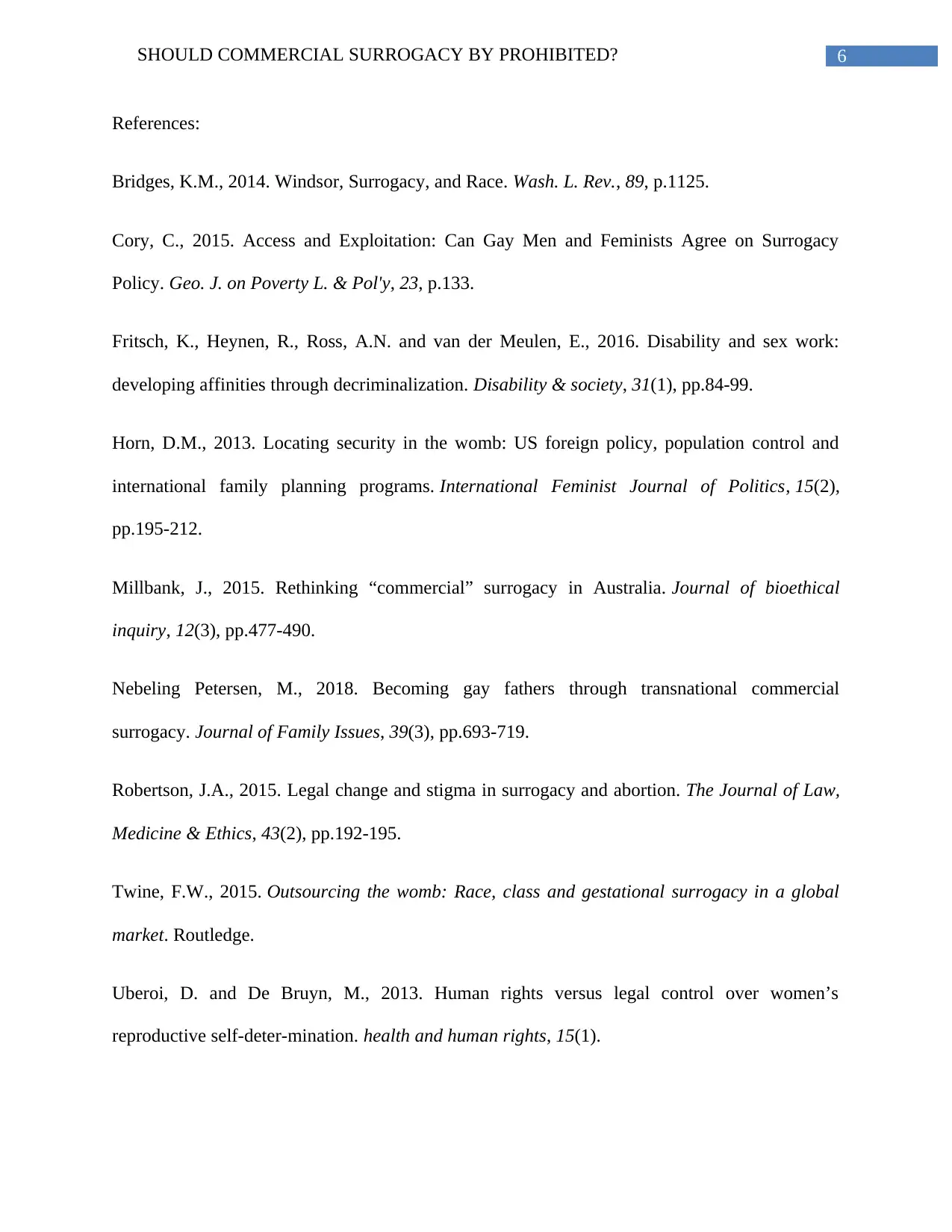
6SHOULD COMMERCIAL SURROGACY BY PROHIBITED?
References:
Bridges, K.M., 2014. Windsor, Surrogacy, and Race. Wash. L. Rev., 89, p.1125.
Cory, C., 2015. Access and Exploitation: Can Gay Men and Feminists Agree on Surrogacy
Policy. Geo. J. on Poverty L. & Pol'y, 23, p.133.
Fritsch, K., Heynen, R., Ross, A.N. and van der Meulen, E., 2016. Disability and sex work:
developing affinities through decriminalization. Disability & society, 31(1), pp.84-99.
Horn, D.M., 2013. Locating security in the womb: US foreign policy, population control and
international family planning programs. International Feminist Journal of Politics, 15(2),
pp.195-212.
Millbank, J., 2015. Rethinking “commercial” surrogacy in Australia. Journal of bioethical
inquiry, 12(3), pp.477-490.
Nebeling Petersen, M., 2018. Becoming gay fathers through transnational commercial
surrogacy. Journal of Family Issues, 39(3), pp.693-719.
Robertson, J.A., 2015. Legal change and stigma in surrogacy and abortion. The Journal of Law,
Medicine & Ethics, 43(2), pp.192-195.
Twine, F.W., 2015. Outsourcing the womb: Race, class and gestational surrogacy in a global
market. Routledge.
Uberoi, D. and De Bruyn, M., 2013. Human rights versus legal control over women’s
reproductive self-deter-mination. health and human rights, 15(1).
References:
Bridges, K.M., 2014. Windsor, Surrogacy, and Race. Wash. L. Rev., 89, p.1125.
Cory, C., 2015. Access and Exploitation: Can Gay Men and Feminists Agree on Surrogacy
Policy. Geo. J. on Poverty L. & Pol'y, 23, p.133.
Fritsch, K., Heynen, R., Ross, A.N. and van der Meulen, E., 2016. Disability and sex work:
developing affinities through decriminalization. Disability & society, 31(1), pp.84-99.
Horn, D.M., 2013. Locating security in the womb: US foreign policy, population control and
international family planning programs. International Feminist Journal of Politics, 15(2),
pp.195-212.
Millbank, J., 2015. Rethinking “commercial” surrogacy in Australia. Journal of bioethical
inquiry, 12(3), pp.477-490.
Nebeling Petersen, M., 2018. Becoming gay fathers through transnational commercial
surrogacy. Journal of Family Issues, 39(3), pp.693-719.
Robertson, J.A., 2015. Legal change and stigma in surrogacy and abortion. The Journal of Law,
Medicine & Ethics, 43(2), pp.192-195.
Twine, F.W., 2015. Outsourcing the womb: Race, class and gestational surrogacy in a global
market. Routledge.
Uberoi, D. and De Bruyn, M., 2013. Human rights versus legal control over women’s
reproductive self-deter-mination. health and human rights, 15(1).
1 out of 7
Related Documents
Your All-in-One AI-Powered Toolkit for Academic Success.
+13062052269
info@desklib.com
Available 24*7 on WhatsApp / Email
![[object Object]](/_next/static/media/star-bottom.7253800d.svg)
Unlock your academic potential
Copyright © 2020–2025 A2Z Services. All Rights Reserved. Developed and managed by ZUCOL.





